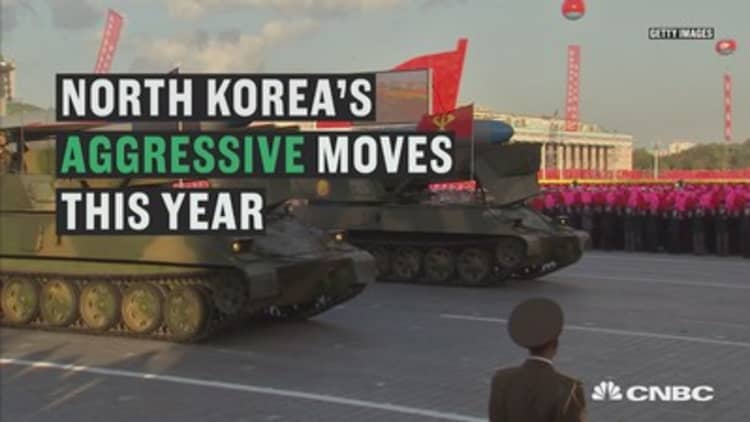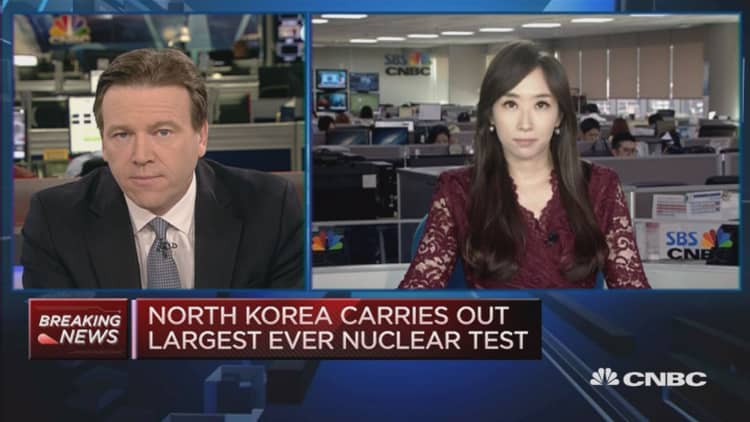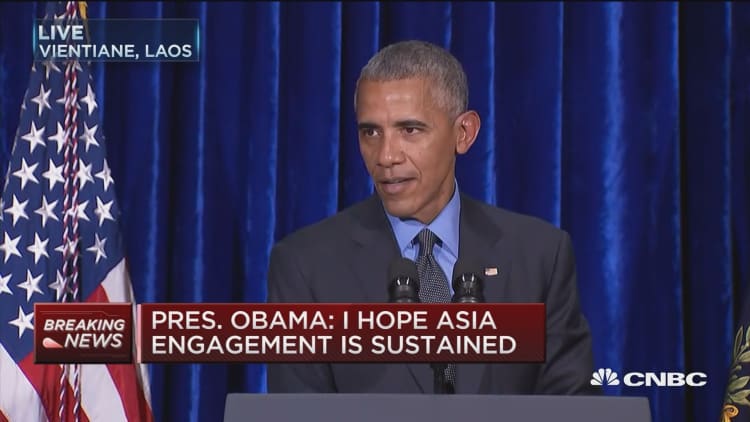
North Korea said it tested a miniaturized nuclear warhead on Friday as protection against "threats and sanctions" from hostile elements, according to the isolated state's official news agency.
North Korea proved that the country could make "standardized" nuclear warheads and mount them on "strategic ballistic rockets."
In a rambling statement, North Korea said the successful test was a demonstration of the country's preparation for retaliation against its enemies, chiefly "U.S.-led hostile forces who have gone desperate in their moves to find fault with the sovereign state's exercise of the right to self-defense while categorically denying the DPRK's strategic position as a full-fledge nuclear weapons state."
The statement from the rogue nation came after multiple global agencies detected seismic activity in North Korea on Friday morning local time. Prior to North Korea's confirmation of the test, both Japanese and South Korean authorities said that they believed the explosion, which caused an earthquake, was the result of fifth nuclear test by their neighbor.
The blast caused by the test was bigger than the one caused by North Korea's nuclear test in January, according to the South Korean meteorological agency.
The agency said the "man-made" quake emitted energy double that emitted by the January nuclear test. The South Korean military said the magnitude 5.0 seismic wave would indicate a 10 kilotonne blast, which would be the isolated nation's largest ever, local news agency Yonhap reported.
Meanwhile, Jeffrey Lewis of the Middlebury Institute of International Studies told Reuters that the seismic activity detected in North Korea indicated a blast of 20 kilotonnes to 30 kilotonnes, which he said would make the test larger than the nuclear bomb the U.S dropped on Hiroshima in World War II and possibly even larger than the one dropped on Nagasaki soon after.

South Korean President Park Geun-hye, who described the North's actions as "maniacal recklessness," held an unscheduled phone call with Barack Obama to discuss the issue, as the U.S. president headed back to the United States from a regional summit in Laos.
The Blue House, South Korea's version of the U.S. White House, said that the two leaders agreed to use every available means to pressure North Korea to abandon its nuclear program.
White House Press Secretary Josh Earnest said later that Obama promised "serious consequences" for provocative actions by North Korea, and reiterated the U.S.'s commitment to the security of its Asian allies.
Japan's Defense Minister Tomomi Inada told a press briefing that the country's test and advances in missile technology posed a grave threat to Japan.
"We can't deny the possibility that North Korea is miniaturizing a device to build a warhead," Inada said.
He added, however, that the magnitude of the quake suggested it was not a test of a hydrogen bomb, as North Korea had claimed to have tested in January.
Japan's chief government spokesperson said Japan would consider further unilateral sanctions against North Korea. Japan is a frequent target of North Korea's aggression, with at least two missiles test-launched in its direction in recent months.
China's official news agency Xinhua said that North Korea's nuclear test was "not wise, but it added that South Korea's decision to deploy a U.S. anti-missile system had damaged the region's strategic balance. China's Foreign Ministry said it was strongly opposed to North Korea's test and urged its neighbor to stop endangering peace in the region.

Earlier Friday the European Mediterranean Seismological Centre (EMSC) had logged a magnitude 5 earthquake in North Korea, at a depth of 10 kilometers, at 9 a.m. North Korean time. The quake was about 349 kilometers southeast of Jilin in China, the EMSC said.
The U.S. Geological Survey (USGS) also detected what it called an "explosion" that it said was 11 kilometers east-northeast of Sungjibaegam in North Korea, near a known nuclear test site.
"The wave form signal for an explosion and an earthquake have differences," Rafael Abreu, a geophysicist at the USGS, told CNBC. "Based on those differences, we are confident it was an explosion. But we can't say with any certainty what type of explosion."
He noted that the energy release was equivalent to a 5.3 magnitude earthquake.
It is the latest in a series of provocations by North Korean leader Kim Jong Un.
In January, North Korea launched its fourth-ever nuclear test, which initially set off warnings of a shallow earthquake. North Korea claimed at the time that the device was a hydrogen bomb, which it called the "H-bomb of justice," although experts said that there was no evidence that the explosion was a hydrogen bomb..
The launch of a long-range rocket in February prompted even tighter United Nations sanctions against the country.
North Korea has conducted a series of missile tests in recent months, including a series of three missile tests on Monday as leaders of the Group of 20 nations held a summit in China.
Kim Jong Un has called recent U.S.-South Korean military drills in South Korea, as well as plans for the South to host a U.S. anti-missile system called THAAD, a provocation.
Analysts at the U.S.-Korea Institute at Johns Hopkins University reported on their website in late August that based on its current missile activity, North Korea was on track to develop the capability of hitting targets in the region, including Japan, by 2020.

